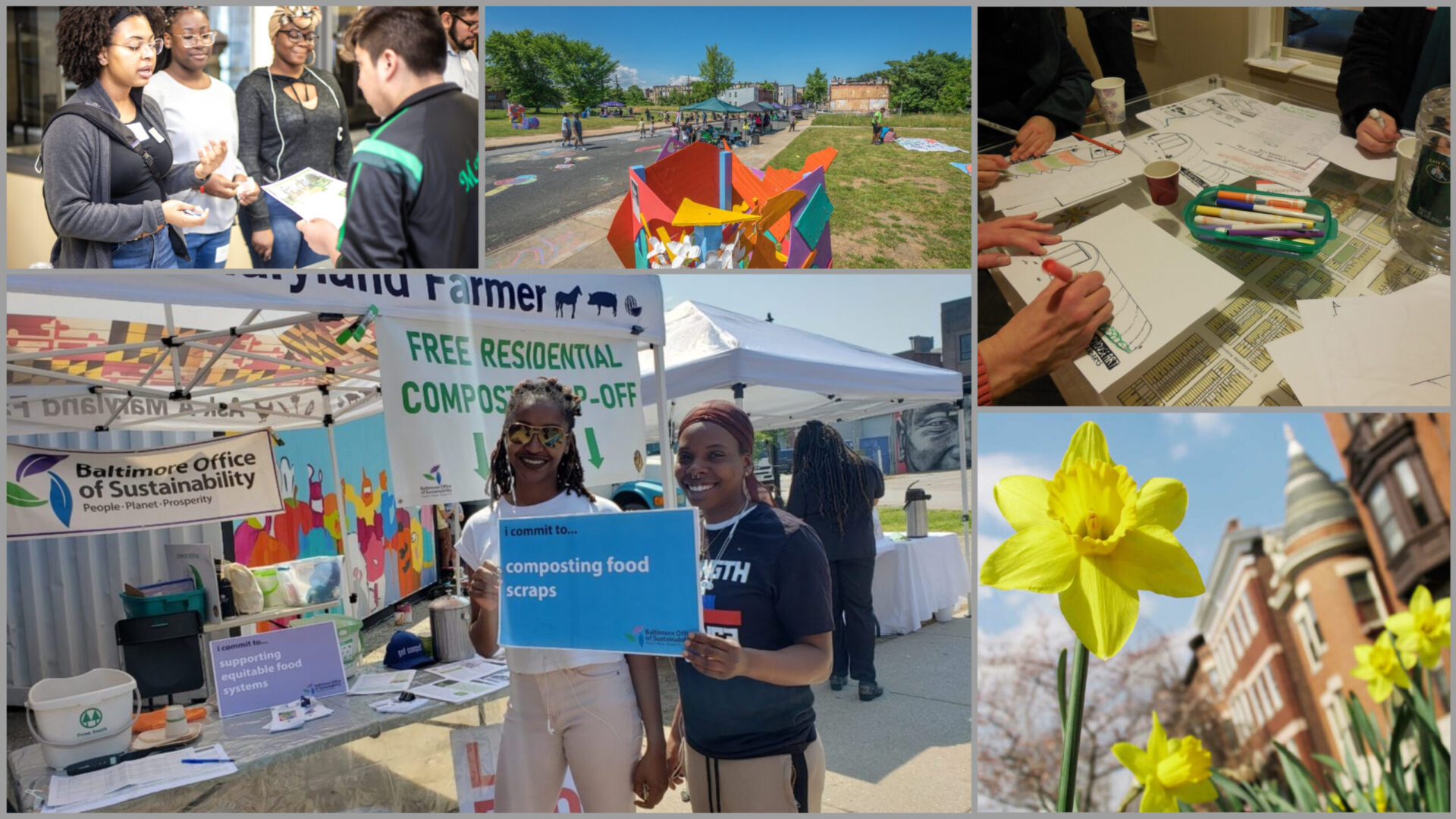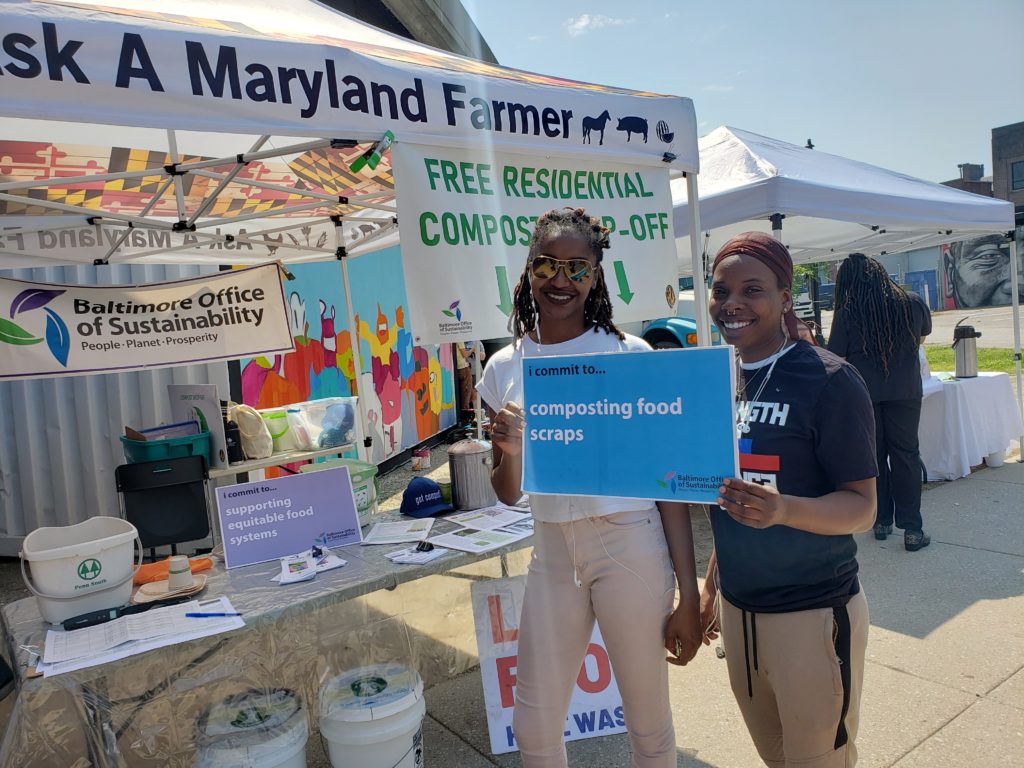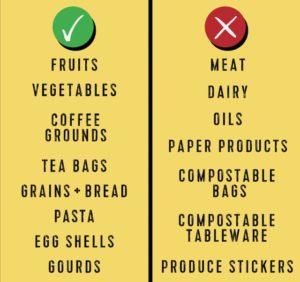Born out of the Baltimore Food Waste and Recovery Strategy, Baltimore City’s Food Matters program is a collaborative effort to reduce food waste in cities between the Natural Resources Defense Council (NRDC) and the Baltimore Office of Sustainability (BOS), with support from The Rockefeller Foundation. Across United States, 40% of all the food produced is never eaten. In Baltimore, approximately 25% of residential waste generated is food waste and overall one third of the materials sent to our landfill and incinerator are compostable. At the same time, 138,150 people (22.2%) in Baltimore are food insecure – equating to an annual meal gap of 24 million.
Food Matters-Baltimore is advancing food waste reduction, food rescue and food scrap recycling citywide. Since the implementation of the program, BOS has committed the city to reduce half of all wasted food generated in the city by 2030. To reach this goal, BOS is implementing community-led solutions and programs, creating stronger linkages between food rescue stakeholders and food insecure residents and providing capacity building funds to current food waste reduction efforts in the city. Our current projects include: (1) the implementation of a decentralized community composting program with multiple drop-off locations in the city, (2) the Save The Food Campaign designed to educate consumers about practices which prevent edible food from going to waste, and (3) food rescue expansion via the Feeding America MealConnect App.
Educational Materials
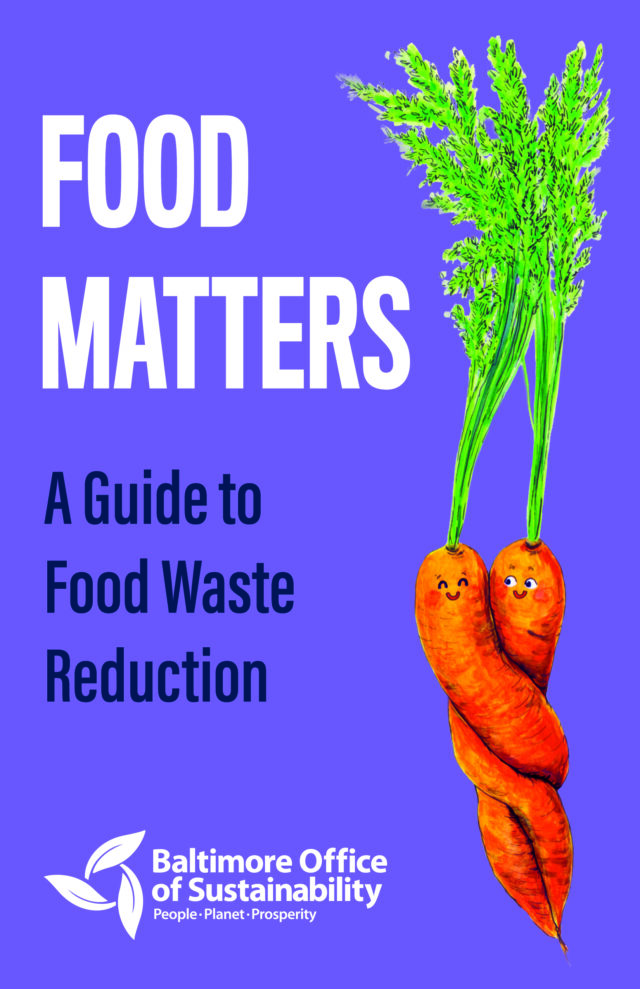
Working with amazing local graphic artist Yifan Luo (@yifanluoart), the Baltimore Food Matters team has created a brochure and tip sheet to help educate and shift mental models around composting and food waste reduction, which you can download here and learn more about here.
We have also created a series of posters on how you as a city resident can help Make Food Matter:
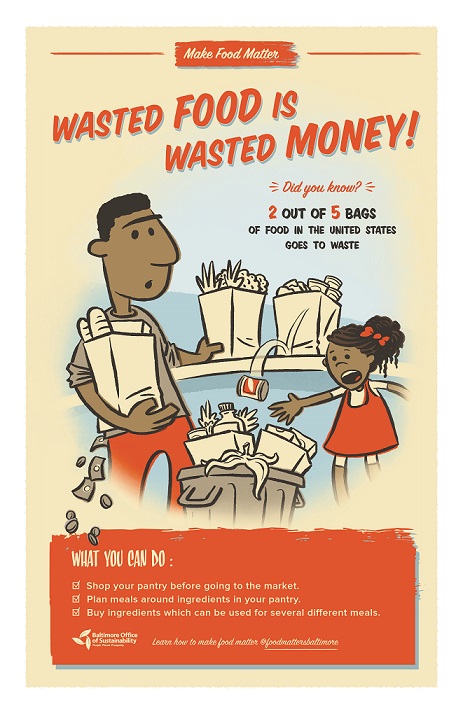
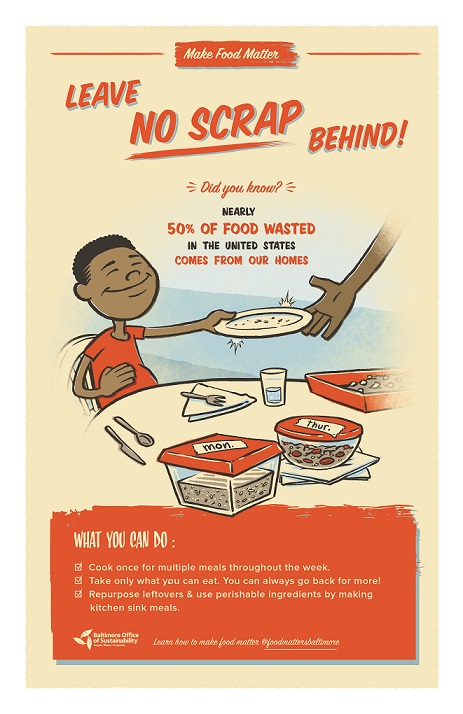
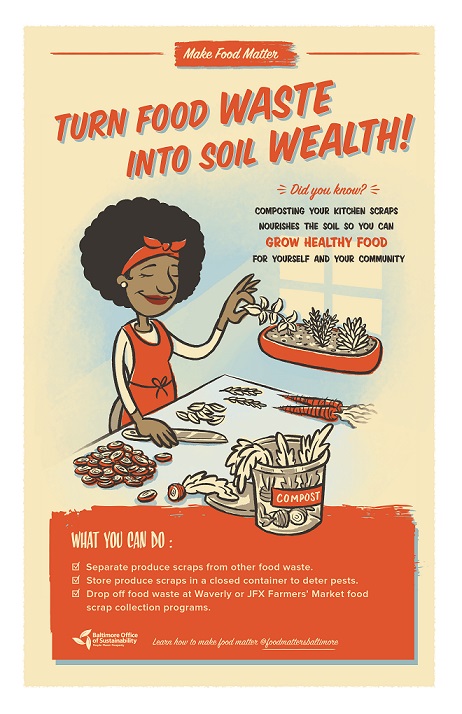
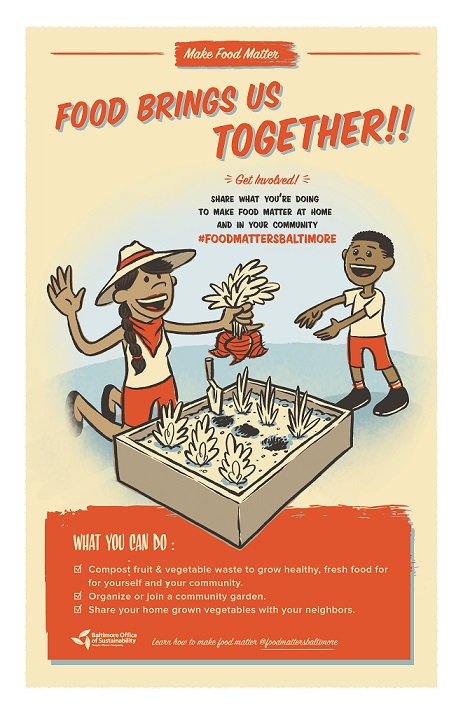
If you would like copies of the brochure or posters for your program or community, reach out to us at sustainability@baltimorecity.gov.
Farmers Market Food Scrap Drop-Off:
Updated Guidelines
***We are no longer accepting compostable bags or paper items – this includes coffee filters, paper plates, bags, cups and paper towels. As a reminder – our food scrap collection is all plant-based (egg shells are appropriate to drop-off).***
We are collecting your food scraps every Saturday from 8:00 AM to 12:00 PM at the 32nd Street Farmers’ Market and every Sunday from 7:00 AM to 12:00 PM at the JFX Farmers’ Market! We have expanded our farmer partners and are feeding more happy pigs as a result. Please remember the food-scrap collection guidelines. The biggest contaminant we are seeing is PRODUCE STICKERS and PAPER TOWELS both of which are not good for the pigs. Thank you in advance for your cooperation.
- Interested in volunteering at the markets? Sign up today!
- Can’t make it to the Farmers Market? Check out a list of Food Scrap Haulers in Baltimore serving Baltimore-area residents.
- To learn more about composting, check out these resources:
Wasted Food Prevention Resources
- Deciphering Dates on Products
- Fall and Winter Produce Storage Guide
- Spring and Summer Food Storage Guide
- Smart Shopping Guides
- 10 Easy Tips for Meal Planning
- Fridge Demystified
With support from the Rockefeller Foundation, the NRDC Food Matters project is working with the Baltimore Office of Sustainability to develop and implement strategies that will drive dramatic, innovative, and systems-wide food waste reduction and diversion. A critical element of the Food Matters project is a commitment to equitable, transparent, and mutually beneficial partnerships with local partners in Baltimore City. NRDC has supported local partners in food waste reduction and diversion to increase their capacity to drive sustained action. In total, 11 applicants were awarded up to $10,000 to support the city’s goals of reducing food waste by 50 percent by 2030 (an action in the 2019 Sustainability Plan) and residential food waste by 80 percent by 2040 (as laid out in Baltimore’s Food Waste and Recovery Strategy). Learn more about each of the grant winners by reading a brief description of their organization below.
Coppin State University’s Department of Natural Sciences stands firmly on the university motto of nourishing potential and transforming lives. The school is uniquely positioned in the heart of West Baltimore (2500 W. North Ave) and has charged itself with bringing awareness and crafting solutions for Baltimore’s Urban Agriculture Industry while creating a model for Sustainability – bringing awareness to the issue of food waste in Baltimore City and the related impacts. Coppin feels it is time to change the narrative around these key issues through increased community engagement.
Countered’s solution to food deserts – a model for what a healthy corner store should look like in Baltimore’s most underserved neighborhoods. One that sells food from farms that would otherwise be thrown away, stores excess produce from food retailers in the region and serves as a community anchor. Countered provides fresh rescued produce/food to over 7,000 residents in Reservoir Hill and Penn North. Countered is supporting food rescue efforts to help launch a robust community education program that expands food waste prevention efforts in West Baltimore.
Food Rescue Baltimore (FRB) reduces food waste and strengthens communities by recovering excess, unsaleable, and unwanted food from distributors, supermarkets, and producers, and distributing it in food insecure neighborhoods of Baltimore, thus ensuring their equal access to nutritious food. FRB also educates communities about healthy food choices, and how to prepare meals with fresh food typically found at their rescue sites.
Fort Worthington Elementary and Middle School
Fort Worthington is a 21st century community school supporting innovative and sustainable processes. The school will implement a food waste prevention program to create a composting station at their community garden which will provide students with experiential learning opportunities on food waste reduction and urban agriculture.
Institute for Local Self-Reliance
Founded in 1974, the Institute for Local Self-Reliance (ILSR) is a nonprofit advancing recycling, zero waste, decentralized energy, independent businesses, and other facets of a homegrown economy. ILSR has a long history of advancing composting as a means to create jobs, enhance soils, sequester carbon, and reduce waste. The organization will be offering a series of workshops on how to compost at home and at the community garden level. Participants will learn the basics of composting and how to compost successfully. ILSR is collaborating with several sites throughout the City to host the training including Real Food Farm, Filbert Street Community Garden, and the Recovery Garden.
South Baltimore Community Land Trust
The South Baltimore Community Land Trust (SBCLT) hosts the Filbert Street Community Garden which has developed over ten years to become the center of Baltimore’s zero waste activity. SBCLT and the garden support the Baltimore Compost Collective, a youth powered composting operation that has over 60 residents registered for a monthly curbside food scraps pick-up service. Youth participants come directly from SBCLT’s participatory action research program they take for college credit at Benjamin Franklin High School. Destiny Watford, an alumnus of the school co-teaches and manages this program along with Meleny Thomas – a long time resident and educator and Prof. Nicole Fabricant of Towson University’s Anthropology Department.
Strength to Love II is a community-based program in west Baltimore’s Sandtown-Winchester neighborhood that uses a 1.5 acre farm to offer employment to citizens returning to the community from incarceration. The farm helps address what its leaders call food apartheid issue in the surrounding neighborhood. As a program of the nonprofit Intersection of Change, the farm is driven by a mission to enrich the economic, social and spiritual lives of those dealing with poverty-related issues in their community. In the coming year, the farm will work to reduce the generation of wasted food by ensuring their foods nourish those experiencing food apartheid and avoid throwing our edible foods.
The 6th Branch is a veteran-led neighborhood development organization that works in four neighborhoods in East Baltimore – Oliver, Johnston Square, Darley Park, and Broadway East. ^th Branch works with community associations and leaders to identify vacant and abandoned lots connecting volunteers with these lots to transform them into community green spaces. The organization cultivates more than 13 acres of green space across the city with the help of nearly 2,500 volunteers each year. Their motto is “Grab a Shovel.” 6th Branch works alongside neighbors and volunteers daily to serve their country by serving the City of Baltimore.
Founded in 2014, Be. is led by Executive Director, Tonee Lawson. Be. has implemented youth programs in areas of social emotional learning, literacy, STEM enrichment, and college readiness for over 400 youth in Baltimore. Their Girls Empowerment Academy engages young girls in self-empowerment and STEM enrichment programming. Be.’s STEM topics span from science in the kitchen to microbiology. The Food Playground hosted by Be. also provides a hands-on comprehensive culinary focused STEM program for adolescent girls of color. The pilot program will serve girls grades 6-8 across Baltimore City with priority acceptance given to girls residing in underinvested neighborhoods and food deserts. Sample lessons include “no waste cooking,” “from farm to table,” “composting,” and “chemistry with pancakes.”
United Workers Association/Baltimore Compost Collective
The Baltimore Compost Collective (BCC) is a project of United Workers – in partnership with the Institute for Local Self-Reliance and Filbert Street Community Garden. The Baltimore Compost Collective is a youth entrepreneurship program that trains participants in workforce skills, food access programming, and community-scale composting in the Curtis Bay neighborhood. It provides first-time employment for area youth, giving them experience working with a green start-up enterprise and entrepreneurial skills. Youth are trained in composting best management practices – receiving guided, hands-on experience managing a small-scale composting operation and its exp. The program also supports Filbert Street Garden’s outdoor education and food access programming. BCC anticipates that the success of the Baltimore Compost Collective as a model for community-oriented composting operation that will lead the City to invest in a distributed composting infrastructure that builds community and equity.
Whitelock Community Farm is a vibrant open space that grows food and activates community to promote social equity in the neighborhood. The farm works to create educational, skill building, and leadership development opportunities; increase access to healthy, affordable food; foster positive community activity; and promote dialogue about food access, neighborhood development, and environmental justice. As part of this work, Whitelock Community Farm operates a community composting system, which has diverted over 13,000 gallons of food waste, and organizes workshops to teach neighbors about composting methods.
The Save The Food campaign was launched by the NRDC and the Ad Council in 2018 to raise awareness about food waste in the U.S. The site features useful tips to prevent edible from from being wasted through meal planning tools such a the a guest-imator, recipes made with leftover foods and storage suggestions for common perishable food items. Want to learn more? View the videos below and visit the Save The Food website to learn about what you can do to prevent food – a vital resource – from unnecessarily being wasted.

